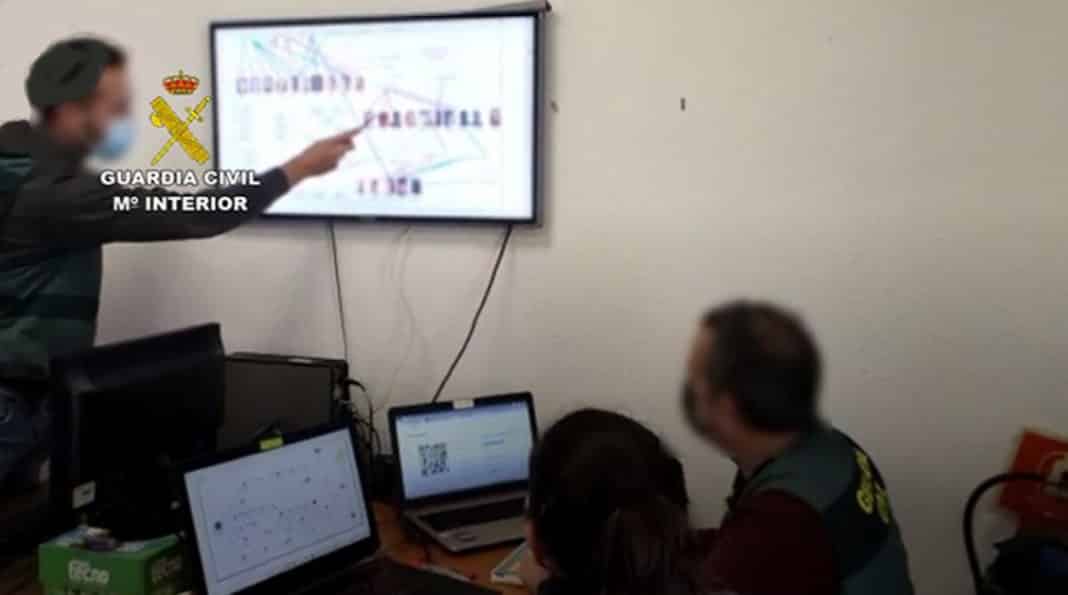The Guardia Civil, within the framework of the Operation Chrimata, has dismantled in Alicante a network dedicated to committing bank scams at an international level and on a massive scale through the method of phishing, in its form of smishing. They invested the money stolen from the accounts of the injured in cryptocurrencies, in order to be able to launder it without leaving a trace.
8 people have been arrested for the alleged crimes of fraud, forgery of identity documents, money laundering and the establishment of a criminal organisation.
The operation began in April 2020, after the perpetrators carried out, for three consecutive days, a massive attack on a large number of clients of a Spanish bank, by smishing the mobile phones of those affected. They managed to defraud 600,000 euro from a total of 106 injured people throughout the national territory.
The gang collected the data necessary to access the accounts of the injured by sending a text message to the victims posing as their bank. Once the injured parties bite, the authors took control of their accounts from the entity’s online platform, and modified the form of access. The injured parties are all clients of the same bank, with national headquarters.
After having control of the accounts, they made massive transfers of about 5,000 euro each, from those of the injured to accounts of people used as mules, registered with online financial companies.
These people, known as money mules, transfer money of illegal origin received into your account, and in return give you a commission.
The investigators located up to 28 of these mules, verifying that 462,000 euro of the total money scammed were passed through their accounts to the injured. The remaining 128,000 euro were scammed by similar methodology and means, to different businesses in Paris (France).
Investing in virtual currencies or cryptocurrencies
After transferring the money to the mules’ accounts, they invested it in the acquisition of virtual currencies or cryptocurrencies, thus achieving, in addition to laundering the black money, to avoid tracking by researchers, since the main characteristic of cryptocurrency, is that the source and destination data are encrypted making it very difficult to track. Once the virtual currencies were acquired, they were transferred to the accounts of the main members of the gang, who thus managed to remain anonymous.
The use of digital media also makes it easier for criminals to operate from or to any geographic location, a feature that adds to the work of police investigation.
After studying the information obtained, the agents have been able to identify a complex criminal network made up of 90 people of Latvian, Russian, Czech, Kazakh, Belarusian, French, German, Cameroonian and Ukrainian nationalities.
In Spain, eight people, between 40 and 59 years old and of Spanish, Romanian and Ukrainian nationalities, have been arrested; in the towns of Malaga, Seville, Murcia, La Coruña, Zaragoza, Gerona, Valencia and Elche. In addition, a total of 25 bank accounts have been blocked and brought to justice.
On the other hand, 43 international arrest warrants corresponding to the main members of the criminal group have been requested from the competent judicial authority. The proceedings, which were made available to the Alicante Investigating Court, have been transferred to the National Court.
The operation has been carried out by agents belonging to the Investigation Area of the Guardia Civil of San Juan (Alicante), who have had the collaboration of agents of the Technical Unit of the Judicial Police of the Guardia Civil of Madrid, of the Units Organics of the Judicial Police of Gerona, Malaga, Seville, Zaragoza and La Coruña, as well as members of Interpol, Europol, and different police forces from Latvia, Russia, France, Kazakhstan, Germany, Canada, United States, Liechtenstein, Cameroon , Czech Republic, Ukraine, Poland, Belarus and the United Kingdom.





